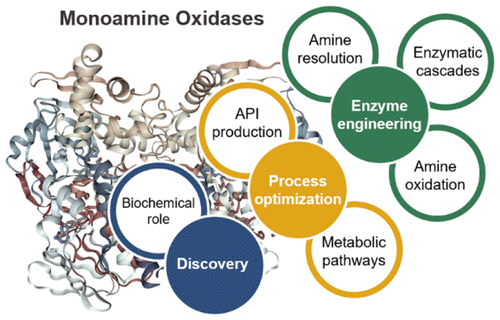Leveraging cutting-edge enzyme AI design technology, EnzymoGenius™ specializes in discovering tailored solutions for biocatalysts in drug synthesis and biomanufacturing.
Background
Monoamine oxidases (MAOs) play a pivotal role in the fields of drug synthesis and biomanufacturing. These enzymes are essential for the transformation of biogenic amines, including neurotransmitters like serotonin, dopamine. Their significance in these processes is underscored by their physiological and pathological pathways involvement. In drug synthesis and biomanufacturing, MAOs serve as versatile biocatalysts, facilitating the production of pharmaceuticals, chemicals, and biofuels.
 Fig 1. Multiple applications of monoamine oxidase. (Batista V F, et al., 2018)
Fig 1. Multiple applications of monoamine oxidase. (Batista V F, et al., 2018)
The advent of artificial intelligence (AI) has revolutionized the way we approach enzyme design, including that of monoamine oxidases. AI algorithms, driven by vast datasets and cutting-edge computational methods, have enabled the precise customization of MAOs for specific applications. This AI-driven approach allows us to optimize enzyme properties, enhancing their efficiency, selectivity, and stability.
Products and Solutions Offering
Customized Monoamine Oxidases
Tailored monoamine oxidases optimized for specific drug synthesis and biomanufacturing applications, with the following key features:
- High Activity. Our enzymes exhibit exceptional catalytic activity, ensuring efficient reactions.
- Substrate Specificity. Precisely engineered to target desired substrates, enhancing selectivity.
- Stability. Robust enzymes with prolonged activity, suitable for long processes.
Custom Solutions
- Enzyme Optimization. Fine-tune enzyme properties for optimized catalysis.
- Process Integration. Seamlessly integrate enzymes into existing workflows for enhanced efficiency.
- Scale-Up Support. Ensure smooth transitions from lab-scale to industrial production.
- Product Development. Collaborate on novel enzyme-based products for specific applications.
Process for AI Design of Monoamine Oxidases
1. Data Collection and Analysis
- Gather extensive biochemical data on MAOs.
- Analyze protein sequences, structures, and catalytic mechanisms.
2. Algorithmic Modeling
- Use advanced algorithms to predict MAO behavior under different conditions.
- Apply quantum mechanics and molecular dynamics simulations for insights.
3. Tailored Design
- Modify MAO structures using AI algorithms to optimize active sites.
- Enhance enzyme selectivity and efficiency through rational design.
4. Virtual Screening
- Screen virtual libraries of potential mutants with AI techniques.
- Select the most promising candidates for experimental validation.
5. Experimental Validation
- Synthesize and test designed MAOs in vitro and in vivo.
- Refine enzyme properties through iterative design and validation.
6. Scalable Production
- Scale up AI-designed MAOs for biomanufacturing.
- Integrate engineered enzymes into bioprocesses for efficient production.
Our Technological Advantages
- Enzyme AI Design. Utilize advanced AI algorithms to predict enzyme behavior and optimize properties.
- Molecular Docking. Employ computational techniques for substrate-enzyme interactions.
- Protein Engineering. Modify enzymes at the molecular level to enhance their functionality.
- Data Analytics. Analyze vast datasets to identify patterns and optimize enzyme performance.
- Automation. Streamline processes through automated workflows for increased productivity.
- Bioprocess Optimization. Maximize yield and reduce costs through process refinement.
With a steadfast commitment to advancing drug synthesis and biomanufacturing research, our customized products and solutions empower scientific communities worldwide. Contact us to embark on a journey of enzyme-driven discovery and transformative biocatalysis.
Reference
- Batista, V. F.; et al. Monoamine oxidase: tunable activity for amine resolution and functionalization. ACS Catalysis. 2018, 8(12): 11889-11907.

































 Fig 1. Multiple applications of monoamine oxidase. (Batista V F, et al., 2018)
Fig 1. Multiple applications of monoamine oxidase. (Batista V F, et al., 2018)